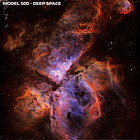The world is still in bad shape, and even for those who despise techno, the following holds true: those who refuse to engage with it are unlikely to change their negative attitude towards this music, no matter the incentives. The machine sound that came out of Detroit at that time produced great things and should have been included in Unesco’s cultural heritage before Berlin techno.
In the 1980s in Motor City, young musicians such as Juan Atkins, Derrick May and Kevin Saunderson developed their own amalgam of P-Funk, New Wave and the electronic folk music of Kraftwerk with drum computers and synthesisers. With his duo Cybotron, Juan Atkins delivered one of the blueprints for techno on their 1983 début album »Enter«. Songs like »Cosmic Cars« revealed the new style with its angular funk, and the single »Techno City« gave the whole thing a name.

Deep Space
A little later, Atkins split from his more rock-oriented comrade-in-arms Richard Davis and founded the solo project Model 500. With the first single from 1985, released on his own Metroplex label, Atkins brought another major weakness into play in addition to his love of domestic cars: science fiction. The single was aptly titled »No UFOs«.
However, it would be another ten years before Model 500 released a »proper« album. His »Classics« album had already been released in LP format in 1993, but this was a compilation of earlier material, including the aforementioned début single. Instead, two years later, »Deep Space« collected new material on which his love of space is not only reflected in the titles of the tracks.
Something else had changed on »Deep Space«. Whereas earlier tracks like »Night Drive (Time, Space, Transmat)« from the 1980s were proverbial electro anthems, now you could hear techno in its typical form with a predominantly straight programmed bass drum. At the same time, the record has a space-jazz groove that gently smooths the hard edges.
A sound to get lost in – a future you still want to find
From the very first track, »M 12 Milky Way«, which Atkins co-wrote with his colleague Kevin Saunderson, the synth chords drift into space on an elegantly complex rhythm. The futurism that Atkins cloaks in something like classic astronaut romanticism actually has little of the dystopia that Detroit techno is often associated with, as a rough soundtrack to the mood of the city that went downhill and became increasingly criminal after the death of the car industry there. On »Deep Space«, it’s the names of the highways at the beginning of each track that recall the motorised pride of yesteryear.
The result is techno right down to the T as a way to transform repetition into trance, whether you choose to dance to it or not.
Atkins brings a sliver of harshness into play with his insistent rhythms, but Model 500 is, pardon the pun, light years away from the intensity of Jeff Mills. Atkins also regularly breaks up the atmosphere, for example when he samples a breakbeat soul number like »M 37 The Flow«, sung by Aisha Jamiel, who, at least under her own name, doesn’t seem to have appeared on many records.
However, the »Deep Space« that make Deep Space a classic are the instrumental numbers. On »M 41 Warning«, for example, the minimalist Model 500 combines a spartan driving beat with clearly arranged other sounds that alternate slowly and interlock insidiously. The result is techno right down to the T as a way to transform repetition into trance, whether you choose to dance to it or not.
With »M 69 Starlight«, Atkins then moves to the centre of his galaxy. The beat is reduced to bass and a subtle cymbal beat, and the track consists mainly of a heavily filtered sound that swings through its orbit with a short reverberating echo. From these almost nothing elements, Atkins creates real magic with permanent slight variations, presumably safe to lose yourself in. The future was definitely still OK here.









